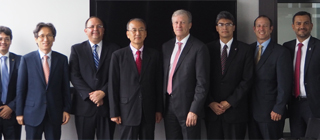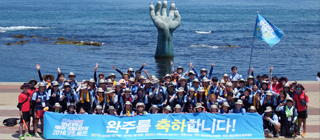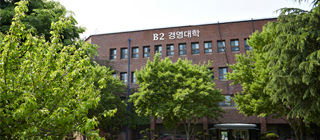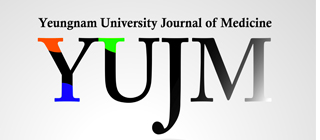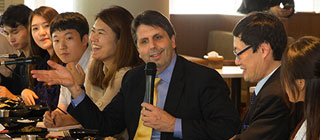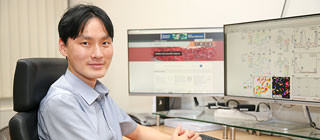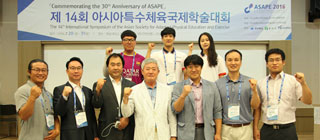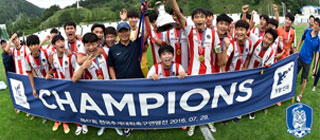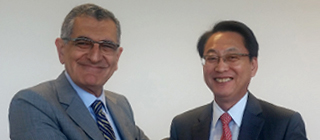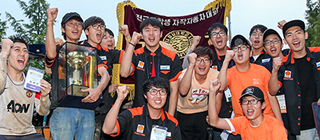-
Chairman of Global Saemaul Forum Choi Wae-chul meets with President of the Central American Bank for Economic Integration Discussions on constructing Saemaul Undong hub in Central and South America Pledge to recommend elites from Central and South America to Park Chung Hee School of Policy and Saemaul [August 10, 2016] <The Global Saemaul Forum and YU teamed up with the Central American Bank for Economic Integration and pledged to cooperate for the global Saemaul Undong and local development in Central and South America> The Global Saemaul Forum (Chairman Choi Wae-chul) and YU joined hands with the Central American Bank for Economic Integration and agreed to actively pursue the construction of a foundation for the global Saemaul Undong and regional development for emerging countries in Central and South America. On the 9th in Seoul, Global Saemaul Forum Chairman Choi Wae-chul (Director of YU Park Chung Hee met with the Central American Bank for Economic Integration (hereinafter CABEI) President Nick Rischbieth who visited Korea and agreed to cooperate for the economic development of Central and South America and for the development of local communities such as rural areas. CABEI is the largest financial institute in Central and South America and was founded in 1960 for the balanced social and economic development of member nations and to promote regional economic integration. Its headquarters is based in Tegucigalpa, the capital of Honduras, and is comprised of a total of 12 nations such as seven from Central America including Honduras and five outer region nations such as Argentina, Columbia and Taiwan. While meeting with Mr. Choi Wae-chul, Mr. Rischbieth said, "Up until now, CABEI mainly focused on its role as a commercial bank, but it is now making more active attempts to fulfill its role as a development bank that supports regional development of emerging nations in Central and South America." He asked that the Global Saemaul Forum and YU play a bigger role in the new development projects of CABEI in the future. He also expressed considerable understanding and interest in Korea's Saemaul Undong and stated with emphasis, "Korea's development experience such as the Saemaul Undong will be very helpful to the underdeveloped countries of Central America. Mr. Choi responded, "Sharing the successful Saemaul Undong experiences of Korea is Korea's mission to the international community," and added, "We will cooperate closely with CABEI to spread the Saemaul development program to Central America." On this day, Mr. Choi requested that CABEI participated in the international NGO, Global Saemaul Development Network (GSDN), which Mr. Rischbieth said that we would positively review this. GSDN was established in September of last year to push forward with Saemaul development cooperation programs for emerging nations and to overcome poverty in the global community, and it is currently headed by Mr. Choi Wae-chul as its chairman. Mr. Choi also invited Mr. Rischbieth to the '2017 Global Saemaul Forum' scheduled for June of next year, and Mr. Rischbieth happily accepted the invitation. Furthermore, Mr. Rischbieth also welcomed Mr. Choi's request to recommend young talents such as elite public employees of Central America to the YU Park Chung Hee School of Policy and Saemaul (Dean Park Seung-woo), and expressed his appreciation. There are currently over 230 students from 48 countries around the world enrolled at the Park Chung Hee School of Policy and Saemaul, but compared to Asia, Africa and South America, there are few students from Central America. It is expected that through this meeting with CABEI, more students from Central will come study at YU. At this meeting between Mr. Choi and Mr. Rischbieth were present CABEI CFO Hernan Danery, International Relations Bureau Director Salvador Sacasa, CABEI Costa Rica Secretary General Mauricio Chacon, and three other secretary generals of three countries, for a total of six senior officials from CABEI, while from YU were present Park Chung Hee School of Policy and Saemaul Dean Park Seung-woo and Global Saemaul Development Network (GSDN) Secretary General Kim Gi-soo (YU professor of business administration).
-
'2016 YU Road' on 14th 300km walk over 8 nights and 9 days from Gumi to Pohang. Averaged 33km daily Participated in character building programs by visiting Yeongcheon Seonghwansan (Mt.) memorial tower and ancient home of Gyeongju Choi Family [July 22, 2016] <YU students who completed the 2016 YU Road Walk (22nd, Homitgot, Pohang)> The energetic shouts of YU students shook the grounds of Homigot in Pohang in the afternoon of the 22nd. Their voices were filled with passion and a sense of achievement by completing a 300km march over 8 nights and 9 days. In the afternoon of the 14th, 80 YU students started off the 'National Pilgrimage March' at the old home of the Late President Park Chung Hee in Gumi. The distance that they decided to take on as a challenge spanned across 300km starting from Park Chun Hee's old home to Homigot of Pohang. The students who took on this demanding challenge passed through Gumi, Gunwi, Yeongcheon, and Gyeongju to arrive at Homigot of Pohang over 8 nights and 9 days to the 22nd. They marched an average of 33km per day. Lee Hoon-il (24, electric engineering, senior), who participated in this march as the student leader, said, "There were times that I wanted to give up because of the hot weather and tiring trek, but I am happy that all of us pushed and pulled each other to finish the challenge successfully. I would like to express my thanks to all of the students who participated in this march," while adding, "This march was a very meaningful in that I was able to reflect on myself. I hope that more students will participate in the future and have the opportunity to gain more confidence in themselves." During this incredible march, the students visited the Yeongcheon Seonghwansan (Mt.) memorial tower and the Yeongdeok Jangsa Amphibious Landing Victory Memorial Park to remember the past patriots and to renew their vows to protect the homeland. They also visited the ancient home of the Gyeongju Choi Family to once again remember the spirit of noblesse oblige, in various character building programs. 'YU Road' a national pilgrimage march that has been offered annually since 2009 is being operated by YU with the goal of fostering its ideal 'Y Type Talents (talents with creativity, progressiveness and expertise based on character).
-
Korean Association of Business Education Accreditation gives balanced assessment in seven fields of accreditation such as professors, students and facilities Since receiving accreditation for the first time in August 2011, maintained accreditation for seven consecutive years to July 2018 Simultaneous accreditation for graduate school business administration department, being officially recognized for highest quality of education [August 8, 2016] <School of Business> YU (President Noh Seok-kyun) received 'accreditation for business education' from the Korean Association of Business Education Accreditation (KABEA). With this accreditation, the YU School of Business and Graduate School of Business Administration maintained its 'accreditation' status until July of 2018. Accordingly, the YU School of Business will maintain accreditation status for the seventh consecutive year since first receiving accreditation in August of 2011. In this evaluation, YU received accreditation for both its undergraduate and graduate programs, and was recognized for the highest level of education quality in the business education sector. KABEA was established by the Korean Academic Society of Business Administration in 2005. It accredits business education through comprehensive reviews on the overall business education conditions and future plans to improve education such as the vision, mission and goal of the university's business education, learning performance and goals, curriculum, classes, professors, facilities and educational environment, and educational improvements. YU received high scores in seven accreditation fields such as ▲ mission, vision and goal ▲ study objective and performance management ▲ curriculum and classes ▲ students ▲ professors ▲ facilities and educational environment ▲ continuous improvements. YU School of Business Dean Park Jong-moo said, "This accreditation once again certifies the educational competitiveness of the YU School of Business," and added, "We will continue to spare no efforts and investments for business education that is not only top notch in Korea, but can compete at an international level."
-
Yeungnam University Journal of Medicine(YUJM) Fifth registration among the nation's 41 medical schools Recognized for excellence as general medicine journal, founded in 1983, issued twice a year [August 10, 2016] 'Yeungnam University Journal of Medicine (YUJM)', an academic journal published by the YU College of Medicine was selected as a candidate for registration in the National Research Foundation's 2016 academic journal evaluations. YUJM was recorded as the fifth academic journal registered with the National Research Foundation following Yonsei University, Chonnam National University, Hanyang University, and Kosin University among the 41 medical schools in Korea. With this selection, YUJM will be recognized as a candidate journal for registration starting with the 2016 Volume 33-1 (June 30) issue. The National Research Foundation's registration candidate journals are given recognition and status equivalent to registered academic journals, and this selection officially recognized the YUJM as an excellent academic journal having both system and composition as a general medicine journal. YUJM was first founded in 1984 and has been carrying reviews articles, original articles and case reports in basic and clinical medicine fields. It is issued twice a year (June 30, December 31), and articles are received all year round. After being registered in 'KoreaMed', the nation's largest medical thesis database in 2004, YUJM was registered in 'KoreaMed Syapse' in 2013, and is now offering full-texts of academic journals that meet international standards. In addition, it can be searched in domestic databases as well such as KISS and the Korean Medical Database (KMbase). Plans are being made to register in prominent domestic and foreign citation databases such as the National Research Foundation registered journals, PubMed, EMBASE, SCOPUS and SCI(E).
-
Luncheon held with students at the Humanities Hall cafeteria on 27th Free flow conversation mixing humor and wit Students say, 'Down-to-earth and genuine attitude was impressive' [Jul 27, 2016] Mark W. Lippert (44), US Ambassador to Korea, visited YU at around 11:15 a.m. on July 27. As he stepped in to the university president's reception hall located on the 2nd floor of the university head office, Ambassador Lippert said in fluent Korean, "Hello, it is a great honor to visit YU" as he greeted YU president Noh Seok-kyun. YU President Noh responded, "Welcome to our city, the city of summer," and added, "I think we should make our area known by taking advantage of the summer here, which is even called 'Dae-frica'." Ambassador Lippert answered, "I grew up in a hot area so I'm okay with the heat," and added, "I hope that more visitors will come to the Daegu and Gyeongbuk area, which is known for the summer and chicken and beer festival." Ambassador Lippert said that the purpose of his visit to YU was because he "wanted our embassy to play a role to allow talented people in the area to have more opportunities to study in American universities and companies." He also added, "While traveling across the nation, I learned that regions outside of Seoul were also full of talented people and resources. I want our embassy to help relive their concerns when going to the US to study or work. I was born and raised in the east, and it was really unnerving when I first enrolled at Stanford University. I didn't know who I needed to reach out to for help or how to ask for help. I think one of the jobs of our embassy is to act as a guide for those that are in the same situation that I once was in." Ambassador Lippert also mentioned that he wanted more active interaction and cooperation projects with YU, and stated, "That is why I visited YU with our workers. Our staff will continuously provide cooperation for exchange programs with American universities and in internship programs with American companies." After a brief tea time with YU President Noh Seok-kyun, Ambassador Lippert went to the school cafeteria and had a fun conversation with 29 YU students over lunch. He greeted the students in Korean saying, "It smells very good. Eat a lot." He took his seat at the table and enjoyed lunch with YU students going 30 minutes pass the scheduled time. The students did not even bother with the food and continuously asked him questions, and Ambassador Lippert never lost his sense of humor and wit and answered each of the questions he was asked. When asked about the meaning of his son's name 'Sae-joon' and why he was given a Korean name, Ambassador Lippert answered, "I thought it was only natural to give him a Korean name since he was born in Korea." He explained, "A friend went to a fortune teller who brought back three names, and so I chose Sae-joon. The reason for this was because it means a great person who brightens the world and lives an honest life." In addition, Ambassador Lippert, who is a self-proclaimed baseball fanatic, said, as if he took notice that he was in the Daegu-Gyeongbuk region, "I'm a fan of Doosan, but Sae-joon's team is Samsung." The students responded by chanting, "Sae-joon! Sae-joon!" Doh Hye-hyun (20, International Commerce, sophomore), who said that she was a big fan and follower of Ambassador's SNS account, asked why he met particularly a lot of Korean college students, and Ambassador Lippert answered, "I think it is very important to communicate with young people because they are the ones who will lead the future. Furthermore, it's fun meeting with young people because I can gain creative ideas from them. On the other hand, I also want to hear for myself how our embassy can help youths who face realistic difficulties." When asked about his role model, he answered, "I received a lot of influence especially from President Obama. He is very academic, curios, passionate, and knows how to look far into the future with confidence and vision. Of course he is not a perfect person, but there is still a lot to learn from him. Lastly, Ambassador Lippert was asked to give a word of advice for Korean college students. He answered, "Everyone at your age will have uncertainties and fear about the future. I know you guys are going through tough times. But youth is a very unique period in life. There are a lot of choices, and there are also many opportunities to make choices. So don't be too worried about failing. Whatever it is, you should select and work on that one thing that you want at the time. Even if you fail, you will earn something, and there is still a lot of time for youths, and so you can take a different path later. A failed choice is in no way wasted time." Nam Gwan-woo (21, International Commerce, junior), who attended the meeting said, "He had a gentle impression when I saw him on television, and when I met with him, I felt quite comfortable speaking with him." He added, "His down-to-earth demeanor and ability to speak with students comfortably was quite impressive. He seemed very genuine when he talked about his experience in college life and when talking about his children born in Korea." After the luncheon, he accepted the selfie requests by students and also gave his autograph. At around 1:40 p.m. he left YU amidst cheers from students and went on to his next destination. During his visit to YU, Ambassador Lippert was accompanied by his US embassy staff including his advisor, public diplomacy officer, public information officer, as well as Kim Na-yeon (22, business administration, junior) who is doing an internship at the US embassy until the end of July. In the evening, he participated in the Daegu Chicken and Beer Festival for the second straight year.
-
School of Materials Science and Engineering Koh Young-gun team develops new material that has high durability and high ductile strength simultaneously Published in latest issue of global academic journal, 'Scientific Report' Various industrial possibilities by applying technologies with other materials [August 2, 2016] [Source: KBS News] School of Material Science and Engineering Professor Koh Young-gun (39, photo) and his research team is receiving attention from academic circles by developing a new alloy material that upgraded both strength and ductility. Recently, Professor Koh announced his research results by developing a new magnesium alloy, which is receiving attention as a next-generation structural material. The specific gravity of magnesium alloy is only 1.74, which is 75% lighter than steel and 35% lighter than aluminum alloy. However, it has a hexagonal close-packet structure (each particle making up a solid comes into contact with 12 different particles, and thus comes into contact with six particles on a plane, which minimizes empty spaces) and has the critical weakness of having low ductility. Through this research, Professor Koh's research team succeeded in resolving such structural problem and succeeded in procuring both high durability and ductility. Professor Koh said, "In order to resolve the structural problem of magnesium materials, we creatively crossed shear (when opposite forces are applied on any plane of an object, phenomenon where that object is transformed by slipping across that place) transformation and achieved high durability by controlling the nano crystal grain, and at the same time, we succeeded in obtaining high ductility by effectively spreading the preferred orientation of the basal plane." He added, "Normally, when intensity increases, ductility decreases, but through the magnesium alloy that we developed in this study, we were able to obtain the dream material with the paradox of having both durability and ductility, while breaking down past preconceptions." Their research results were published in the latest issue of the world-acclaimed academic journal <Scientific Reports> (impact factor (IF) 5.228) under the title 'High durability and high ductility of light-weight magnesium allow by cross shearing'. Scientific Reports is a comprehensive academic journal spanning across all scientific fields including metals, physics, chemistry and biology published by Nature Publishing Group, which is issued by the world famous science newsletter, Nature. Professor Koh said, "The cross shearing plastic working technology proposed in this research can be applied in existing material processing sectors, and it is easy to commercialize, so it is expected to have great industrial ripple effects." He added, "As an innovative technology for developing high intensity and high ductility materials, it can be applied in different materials such as steel, aluminum and titanium, and so it by expanding the field of application, it will be possible to create new industries." Meanwhile, this study was carried out with the support of the Ministry of Education's Basic Research Support Project.
-
Professors, graduate school students and undergraduate students sweep international symposium of the Asian Society for Adapted Physical Education and Exercise Centrifugal role in academic conference joined 400 experts from both Korea and abroad in the special physical education sector Professor Park Gi-yong serves consecutive term as chairman of ASAPE for the first time ever [August 4, 2016] <Department of Special Physical Education professors and students awarded at the 14th ASAPE International Symposium> The YU Department of Special Physical Education has become the mecca of special physical education. At the 14th International Symposium of ASAPE held at the YU Cheonma Art Center, YU professors and students won the research award, academic award and contribution award, and were thus recognized by experts for their capacities in the special physical education center at both home and abroad. YU Department of Special Physical Education Professor Kim Han-cheol, who served as the chair for this international symposium, won the research award, while Professor Jung Yeon-taek and Professor Kim Chun-jong won the contribution award, and graduate school student Kim Gyung-ho (PhD course in sports science, 3rd term) won the academic award. In particular, undergraduate students in the Department of Special Physical Education participated in volunteer activities for the successful hosting of the international symposium, and received good reviews by domestic and international participants, and received the volunteer award. This conference, which was held for three days from July 29 to July 31, was joined by over 400 professors, graduate school students and experts from 12 countries including Hong Kong, Japan, China, Taiwan, US and Germany, and presented over 80 theses, making it the biggest event ever. The volunteer students were praised for their contributions to successfully hold this event. Furthermore, 10 experts from underdeveloped countries such as Nepal, Mongolia, Kazakhstan, Myanmar, and the Philippines were invited to this academic conference to hold a global special physical education academy to share the values of special education, which received good reviews. Meanwhile, YU Department of Special Physical Education Professor Park Gi-yong confirmed to serve another terms as chairman of ASAPE at this conference. It is the first time in the history of ASAPE for the chairman to serve two consecutive terms, and the term of Chairman Park will be until July 2018. Chairman Park Gi-yong said, "The World Special Physical Education and Exercise Conference is scheduled to be held at YU in 2017" and added, "We are planning to spread traditional Korean sports to underdeveloped countries, while also sharing the development history of special physical education of Korea, academic excellence, and potential for future development and change of special physical education."
-
Second victory after four years Since Head Coach Kim Byung-soo took the reins, opened the golden age with fourth victory cup in national tournament 2014, first time for college team to go to top 8 in the FA Cup [August 1, 2016] <Photo source: KFA> YU took its second victory cup in the National Fall Football Tournament, and stepped up as the nation's top college football team. At the 47th National Fall Football Tournament finals held at Taebaek Sports Stadium in Gangwon-don on the 29th, YU defeated Kyonggi University and won the tournament. Kim Gyung-jooon (20, Sports Science, sophomore, photo on left), who scored three goals in the first half, led the team to crush the opponents by a score of 4 to 1. Kim Gyung-joon started off with a strike with his right foot from distance at the front of the arc in the 23rd minute of the first half. He then scored in the 33rd minute and 40th minute by connecting with his left foot from crosses that came from the right part of Kyonggi University's side to score his hat trick. YU then scored in the 26th minute of the second half with Lee Soon-min (22, Sports Science, junior), to secure their victory. Kyonggi University scored in the 40th minute of the second half, but it was too late to change the course of the match. <Photo source: KFA> Head Coach Kim Byung-soo and Assistant Coach Kim Hyun-joon received the best instructor award by leading the team to victory, while Kim Hyun-tae (22, Sports Science, senior) won the MVP award, Kim Gyung-joon won the highest scorer award, Cha Tae-joo (22, Sports Science, junior) won the defense award, and Kim Tae-hoon (19, Sports Science, freshman) won the GK award, YU won the tournament for the first time back in 2012, and finally retook the throne after four years, proving that they are a force to be reckoned with in football. YU also won the 2010 Spring Tournament, 2012 Fall Tournament, 2013 U League King-of-Kings Tournament, and thus took home their fourth victory cup in national tournaments since Head Coach Kim Byung-soo took the reins of the squad in 2008. The YU team also stirred up the 2014 FA Cup by becoming the first college team ever to make it to the top 8 in the tournament.
-
YU President Noh Seok-kyun and his team visits the US, Brazil, Columbia and Chile Creating global partnership with 7 of Latin America's top 10 universities Met with the local ambassador and consul and pledged cooperation for increased exchange [July 5, 2016] <YU President and University of Sao Paulo President Marco Antonio Zago signs an exchange MOU> Latin America's top university, the University of Sao Paulo (USP) in Brazil that graduated 13 presidents of Brazil, including the current acting president Vice President Temer, and eight governors of Sao Paulo, became a new global partner (left on photo below) of YU. YU President Noh Seok-kyun recently visited the US and Latin America and signed MOUs with world acclaimed universities for exchange in education, research and human resources. In particular, YU displayed a forward-thinking path for internationalization by making a bridgehead for exchange with prestigious universities of Latin America, which has relatively little exchange with Korea not only in universities, but from a national aspect as well. Major companies of Korea such as Samsung Electronics and Hyundai Motors are already competing with global companies in the Central and South American markets. Furthermore, President Park Geun-hye recently led the largest-ever economic envoy and visited countries in South America, showing that the government and corporate sectors have already opted for Central and South America as the new growth engine for the global economy. This is why YU's exchange MOU with universities in Latin America stands out even more. <Photo of signing MOUs with prestigious universities in South America> (from top left in clockwise direction, USP, National University of Columbia, Duoc UC, Pontifical Catholic University of Chile) Mr. Noh visited a total of seven universities. He and his team traveled 42,000km over a span of 11 days and traveled all across the South American continent, and had remarkable achievements. USP, University of Campinas (UNICAMP), and the Pontifical Catholic University of Chile, which ranked 1st, 2nd and 3rd in the QS World University Ranking, as well as the University of Brasilia (UnB) that was ranked 10th last year and 9th this year, and the National University of Columbia (UNAL) that was ranked 13th last year and 10th this year all became new global partners of YU. Duoc UC of Chile, which has achieved remarkable success in Korean language education and the design section, also agreed to cooperate for international academic exchange and human resource exchange with YU. (See the QS Latin America University Ranking below) <<2016 QS Latin America University Rankings of universities that sign exchange MOUs> Thus, YU established global partnerships with 7 of the top 10 universities of Latin America. YU signed international academic exchange agreements with the National Autonomous University of Mexico (UNAM) that was ranked fourth and Monterrey Institute of Technology and Higher Education (TEC de Monterrey) that ranked 7th this year in Latin America in the QS World University Ranking and has begun exchange student programs this year. <YU President Noh Seok-kyun holds meetings with ambassadors in Latin America on promoting exchange> (from top-left clockwise, Ambassador to Brazil Lee Jung-gwan, Ambassador to Chile, Yoo Ji-eun, Ambassador to Columbia Jang Myung-soo, Consul General in Sao Paulo Hong Young-jong) This tour was also a chance for international exchange for the university to lead to promoting exchange on a national level. Mr. Noh held meetings with Ambassador to Columbia Jang Myung-soo, Ambassador to Chile Yoo Ji-eun, Consul General in Sao Paulo Hong Young-jong, and Ambassador to Brazil Lee Jung-gwan, and pledged to cooperate to promote exchange and offer global internship programs among Korean companies in Latin America. On his way back, he visited the alumni association in Atlanta and asked for the support of alumni for exchange with local companies and universities. <MOUs with major universities in the US and Latin America> On this, YU President Noh Seok-kyun said, "Through this visit, YU made a bridgehead to Latin America, which is receiving attention as a new market." He added, "In order to strengthen the global competitiveness of YU, we must pioneer and activate exchange with world-class universities and research institutes." As part of this, YU has shown a sharp incline in its globalization over the past two years. Prior to this tour in South America, YU signed an academic exchange MOU with the University of Delaware, which is ranked in the top 10 of the US for the chemical engineering sector, while also signing academic exchange MOUs with major universities in Europe including Norway, Netherlands and Spain earlier this year. In February of this year, it also visited prestigious universities and major research institutes in Europe such as Oxford University in England, University of Strasbourg of France, and the Fraunhofer-Gesellschaft of Germany. In August of last year, it also visited major universities and government institutes of China such as the Chongqing University of Science and Technology, Chongqing University, Sichuan International Studies University, and the Chongqing Changshou People's Government where they agreed to exchange and cooperation. Thus, YU has been expanding its global partnership with world-class universities and institutes all around the globe. In result, YU rose seven rankings compared to the previous year in the 2016 Asia University Rankings to be placed 128th in Asia (22nd in Korea). In particular, the international student ratio rose considerably from 188th last year to 145th this year, and the number of exchange students going abroad also rose (36th to 32nd), showing an amazing rise in the internationalization index. <YU-University of Sao Paulo MOU article (from the University of Sao Paulo homepage news section)>
-
'Baja SAE Korea’ ends amidst much fanfare 27 teams from 20 universities competed at the YU Gyeongsan Campus from the 14th to 16th YU's 'YUSAE' Team takes Overall First Place [July 16, 2016] <2016 Baja SAE Korea Car Parade> The Baja SAE Korea at Yeungnam University 2016 drew its curtains after an intense three days. This contest, which celebrated its 21st anniversary, was joined by 27 teams from 20 universities including the Korea University of Technology and Education and Ajou University that competed fiercely at the YU Gyeongsan Campus. This year, the YU ‘YUSAE' team took overall first place (photo on left) and received the Minister of Trade, Industry and Energy Award, a trophy, victor's flag, and a cash prize of 2 million won. 'YUSAE', which won first place in 2014, came in second last year, but retook the throne this year and proved that they are the top for self-built cars. Second place overall went to the 'Challenger' team of the Korea National University of Transportation, while third place went to the 'Ja. Yeon. In.' team of the Korea University of Technology and Education. Nam Joon-hyeok (22, Mechanical Engineering, sophomore), the team leader of the 'Ja. Yeon. In.' of the Korea University of Technology and Education, said, "I have been participating in the contest every year for four years since 2013 when I was a freshman. Every year, all of the contestants improve a lot so I always get to learn a lot." He added, "Baja SAE Korea at Yeungnam University includes reviews on vehicle design and papers on the production process, so it has the advantageous that it can enhance both theoretical and practical capacities. One disappointment is that compared to the excellent infrastructure of the contest, it seems that the number of participants have dropped. I hope that more universities will participate next year to make it a festival for everyone." Starting with registration of participants at 9 a.m. on the 14th, static tests were held to judge the uniqueness of the vehicle design, structural safety, driver convenience, ease of maintenance, and possibility for mass production, as well as the basic braking tests, and meetings on rules were also held until late in the evening. <Photo above> The participating teams, volunteers and sponsors were in attendance at the main field at 10 a.m. on the 15th where the opening ceremony was held, and it was followed by a car parade of the participating teams at the main field and roads around the school. The dynamic test was held at the afternoon to check acceleration, max speed, towing force, rock climbing, and passing muddy roads. On the last day of the 16th, the highlight of the contest, which is the endurance test, was held on a 3.5km off-road track at the hill behind the YU water purification center. <photo below> Professor Shin Dong-gil (School of Mechanical Engineering) who oversaw this contest said, "The students will have learned a lot by designing and producing their automobiles with their own hands" and added, "The theories they learned in class and the field experience the gained through this contest will be a valuable asset for students." 'Baja SAE Korea' is a contest in which college students compete with vehicles that they built and first began in 1996. In 2001, it was approved by the US Society of Automotive Engineers (SAE) for the first time in Korea and was promoted to an international competition and is being held every year at YU. The results of the contest are displayed to the entire world through the SAE homepage (www.sae.org) and publications.
